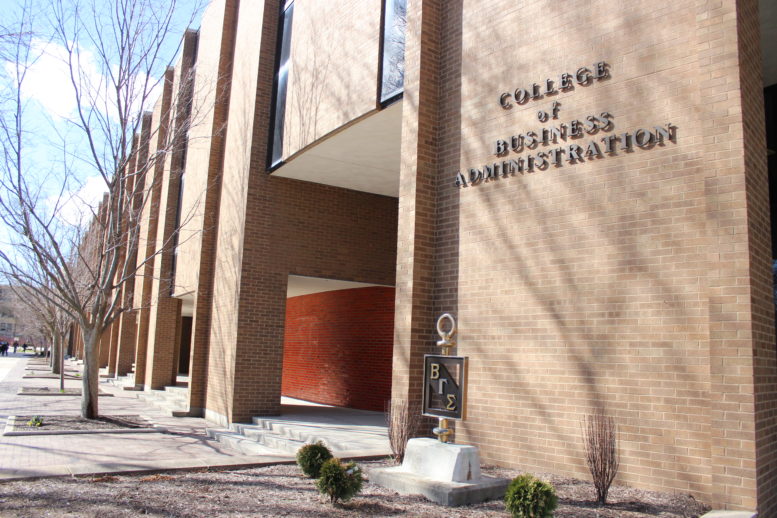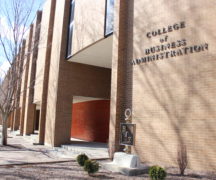By DAVID DUPONT
BG Independent News
Bowling Green State University is seeking help to promote its online business programs, even before one of them is launched.
The university has signed an agreement with Academic Partnerships, a Texas-based company, to help with the marketing and recruiting of its existing online Bachelor of Science in Business Administration degree (EBSBA), and to market an online Master of Business Administration, that is still in the process of being created.
Acting Provost John Fischer said that collaboration was being sought to try to get more enrollment in the eCampus programs. The university is looking more and more to non-traditional, or post-traditional students, to maintain enrollments when there are fewer high school graduates.
The EBSBA is under enrolled, he said, making it a good candidate for such a collaboration. The program is aimed at working adults who want to complete a bachelor’s degree, he said. The EBSBA provides the last two years of the bachelor’s degree.
Academic Partnerships is expected to start recruiting for the EBSBA this fall.
Academic Partnerships will reach out to build relationships with companies to recruit students, as well as providing some mentoring support for students. They will also help market the program. That will include fine tuning language on the program’s web page.
Fischer said prospective students for the EBSBA “want to know as soon as possible how much is it going to cost in its entirety, and how much credit we’ll give them for other coursework they’re bringing in.”
They also want to know if they can get credit for prior learning because of their work experience.
In exchange for these services, Academic Partnerships will split the revenue 50-50 with the university.
The proposed online MBA is meant to address the concern in the drop in enrollment in MBA programs.
“Online MBAs seem to be supplanting face-to-face MBAs,” he said. At some institutions that drop has been significant.
“Cross country the trend is that those are shrinking,” Fischer said. “But we haven’t seen that yet. We don’t want to be naïve. We don’t want to assume we’re the only institution that avoids that trend.”
Fischer said it’s not an either or proposition. “How do we be proactive and preserve the reputation and operation of those face to face models at the same we’re building a strong online one?”
This new online MBA will not replace the three MBA programs the university already has in place.
BGSU offers a traditional classroom-based, face-to-face, program on campus. It also offers two hybrid programs. Those programs bring students to campus, which includes the Levis Commons facility, periodically. The rest of the time the do some work online.
The Professional MBA is aimed at working adults. The Executive MBA is geared toward business people who already have executive experience.
The new collaboration with Academic Partnerships has raised concerns with BGSU Faculty Association.
A letter sent to faculty by the union earlier this spring questioned whether the university had investigated offering the program in-house, and whether faculty had been fully involved.
“In light of the experiences at other universities, the FA is concerned that partnering with profit-seeking corporate entities potentially threatens the quality and integrity of programs and could undermine the important obligation of higher education to support and defend the public good.”
Fischer said that the quality of the program is the foremost concern. He referred to the tagline on the eCampus website: “Reputation matters!”
“For a program like Bowling Green, we’re never going to be able to compete with some of the behemoths in the online world on price,” he said. “What we’re going to be able to compete with is the quality of the engagement in the courses, the rigor and the amount of learning.”
The university wants students to have the kind of experience that leads them to talk to refer other prospective students to BGSU.
“We want to attract students who are looking for a rigorous academic program,” he said.
Some online entities have not done well in this regard, he said, though some, particularly large public universities, are doing better.
That’s crucial for enrollment. “No one wants to go through a particular academic program and feel like they’ve not accomplished something.”
The online MBA will be developed using the same rigorous process used to develop any program, whether offered on campus or through the eCampus.
An online course “has to be as good and engaging as a face-to-face course.”
The online masters will have to work itself through the approval process. That includes being voted on in Faculty Senate, going before the Board of Trustees, before being sent to the state for its final approval.
Fischer said the earliest all that will happen would be spring, 2019.
The College of Business was one of three colleges studied for possible Academic Partnerships collaboration.
In the College of Health and Human Services, degrees in criminal justice and allied health were studied. While the allied health “has been a little slow getting off the ground … it is clearly hitting its stride.”
Criminal justice is popular and probably doesn’t need the enrollment boost at this time, Fischer said.
There is a lot of discussion about graduate programs in education, Fischer said. But after talks with Dean Dawn Shinew of the College of Education and Human Development, they decided they would stick with the current offerings.





